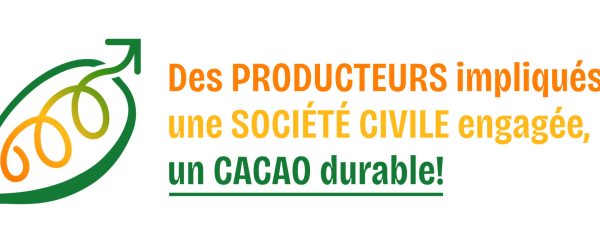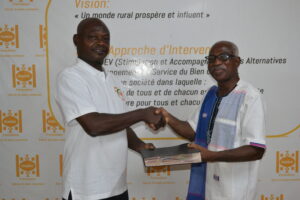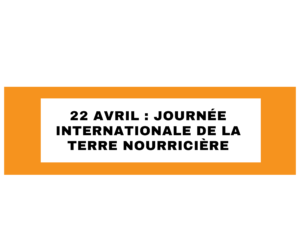PROJET « RENFORCEMENT DE LA SOCIÉTÉ CIVILE POUR LA DURABILITÉ ET LA BONNE GOUVERNANCE DE LA FILIÈRE CACAO EN CÔTE D’IVOIRE »
1. Contexte
La chaîne d’approvisionnement mondiale du cacao est confrontée à des défis majeurs en matière de durabilité économique, sociale et environnementale. Pour développer des stratégies efficaces et bien coordonnées afin de résoudre des problèmes tels que la pauvreté des agriculteurs, le travail des enfants et la déforestation, des approches multipartites sont nécessaires. Elles impliquent les secteurs public et privé, ainsi que la société civile des pays producteurs et consommateurs. Cependant, la participation des organisations de la société civile (OSC) et des organisations de producteurs (OPA) de la Côte d’Ivoire, aux dialogues nationaux et internationaux est actuellement insuffisante. Pour relever ce défi, un ensemble d’organisations de la société civile constitué par Inades-Formation Côte d’Ivoire et INKOTA Netzwerk, a travaillé ensemble pour renforcer les réseaux entre les OSC et les OPA et accroître leur rôle dans les dialogues politiques dans le cadre d’un projet financé par la GIZ de Septembre 2019 à Mars 2023.
Ce projet a permis de créer la Plateforme Ivoirienne pour le Cacao Durable (PICD) en 2020. Outre le financement de la GIZ, la plateforme naissante a également été soutenue par un financement de la Forest Gorvernance, Markets and Climate Programme (FGMC) du Royaume-Uni via l’ONG belge Fern. La plateforme se compose actuellement de 11 Organisations Non Gouvernementale (ONG) et de 55 organisations de producteurs, représentant environ 97 500 productrices et producteurs de cacao (avec 14% des femmes).
Le projet de « Renforcement de la société civile pour la durabilité et la bonne gouvernance de la filière cacao en Côte d’Ivoire » cofinancé par l’Union Européenne et mise en œuvre par le consortium formé par Inades-Formation Côte d’Ivoire, Initiatives pour le Développement communautaire et la conservation de la Forêt (IDEF), Solidaridad West Africa (SWA), INKOTA, Fern arrive donc à un moment critique pour consolider et étendre le travail des membres de la PICD afin de renforcer la légitimité de la société civile à apporter des solutions innovantes et efficaces pour un secteur cacao durable dans les processus de dialogue nationaux et internationaux.
Le projet est mis en œuvre pendant une période de 03 ans allant de mai 2023 à avril 2026 dans les 13 délégations régionales du Conseil Café Cacao (CCC) en Côte d’Ivoire. L’objectif global de ce projet est de contribuer à la mise en place d’un réseau de la société civile pour un cacao durable en Côte d’Ivoire, en lien avec la société civile européenne et les Initiative for Sustainable Cocoa
(ISCO). Plus spécifiquement il s’agit d’améliorer les capacités de communication et de plaidoyer de la société civile ivoirienne, afin qu’elle puisse travailler efficacement sur les défis économiques, environnementaux, sociaux et des droits de l’homme auxquels le secteur du cacao est confronté.
Dans le cadre des actions du projet, il est prévu un atelier de sensibilisation et des renforcement des capacités des médias nationaux et locaux (radio, presse écrite, médias en ligne) visant à améliorer leurs connaissances sur les problématiques et enjeux dans le secteur du cacao en Côte d’Ivoire afin d’augmenter l’intérêt et les reportages de qualité sur les questions de durabilité du cacao.
2. Objectif de l’appel à manifestation d’intérêt
L’objectif général de cet appel à manifestation d’intérêt est de sélectionner 30 journalistes,
Professionnels de la communication et producteurs de contenus des médias nationaux et locaux (radio, télévision presse écrite, médias en ligne) souhaitant mieux s’outiller et contribuer au plaidoyer pour la bonne gouvernance et la durabilité de la filière cacao en Côte d’Ivoire.
3. Les thématiques prises en compte en lien avec la chaîne de valeur du cacao
❖ L’inclusion des femmes et des jeunes
❖ Le trafic humain et le travail forcé
❖ La déforestation et la protection de l’environnement
❖ Le revenu décent, le Marché du cacao et la diversification
❖ La réglementation de l’Union Européenne sur la déforestation
❖ La directive sur le devoir de diligence en matière de durabilité des entreprises ❖ La traçabilité
❖ La Norme Africaines sur le cacao (ARS 1000)
❖ L’observation indépendante
❖ Les différentes plateformes et initiatives dans le cacao au niveau national, régional et international
❖ Etc…
4. Condition de soumission
⮚ Etre journaliste, journalistes,
⮚ Professionnels de la communication et producteurs de contenus exerçant dans la presse écrite, audio-visuelle, médias en ligne
⮚ Etre diplômé d’une institution reconnue
⮚ Avoir un intérêt pour l’agriculture journalistes,
⮚ Professionnels de la communication et producteurs de contenus
⮚ Etre désireux de journalistes,
⮚ Professionnels de la communication et producteurs de contenus, vulgariser les enjeux pour la bonne gouvernance et la durabilité de la filière cacao en Côte d’Ivoire
5. Dossier de Soumission


6. Où soumettre
Cliquez ICI et le remplir
https://support.google.com/drive/answer/6283888
7. Date limite de soumission
20 Décembre 2023










